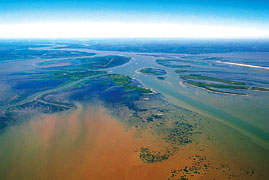 |
| Louisiana Wetlands at stake. (Photo courtesy of ACOE) |
An ambitious $2-billion plan to stem Louisianas massive loss of wetlands along the Gulf Coast is nearing approval by the chief of the Army Corps of Engineers. But even after the program, one of the largest environmental efforts in the Corps history, takes that step forward, it will have to wait in line until at least sometime next year for any significant work to begin. The reason: Congress has yet to approve a water resources bill to authorize new Corps projects around the country including the federal governments $1.2-billion federal share toward the Louisiana coastal plan.
"The near-term big hurdle is actually passing a water resources development act," says Dominic Izzo, vice president in DMJM + Harris Houston office. "Hopefully the new Congress will attend to this very quickly."
Even if lawmakers move swiftly on the water resources measure, the Louisiana coast plan isnt home free in Washington. "The real question is on the appropriations side," notes another industry source. The Corps already has a $11-billion backlog of authorized projects. Adding the Louisiana work to the mix will only make the dogfight for fiscal 2006 appropriations fiercer.
|
As they gear up for that tussle, the Louisiana restorations advocates argue that their situation has national importance. Troy Constance, chief of the coastal restoration branch in the Corps New Orleans District, says Louisiana has 90% of the nations wetlands acreage "and we are suffering most of the loss in the country." The Corps Louisiana Coastal Area Ecosystem Restoration Study, the report its chief will review, shows the vastness of the problem. Mostly because of human activity, including channelization and flood-controlling levees, Louisianas coast has lost more than 1.2 million acres of land since the 1930s. The rate of wetlands loss has slowed, but 6,600 acres still are estimated to disappear annually through 2050.
"The goal of the plan is to reverse the current trend of degradation of the coast," says Dan Hitchings, head of regional business for the Corps Mississippi Valley Division. "Were really looking to stop the land loss, in simple terms."
Wetlands have multifaceted values. Besides sheltering wildlife, they support more than $300 million in commercial fishing, plus $1 billion in recreational fishing and hunting. Wetlands also are flood buffers, protecting industrial infrastructure...


Post a comment to this article
Report Abusive Comment